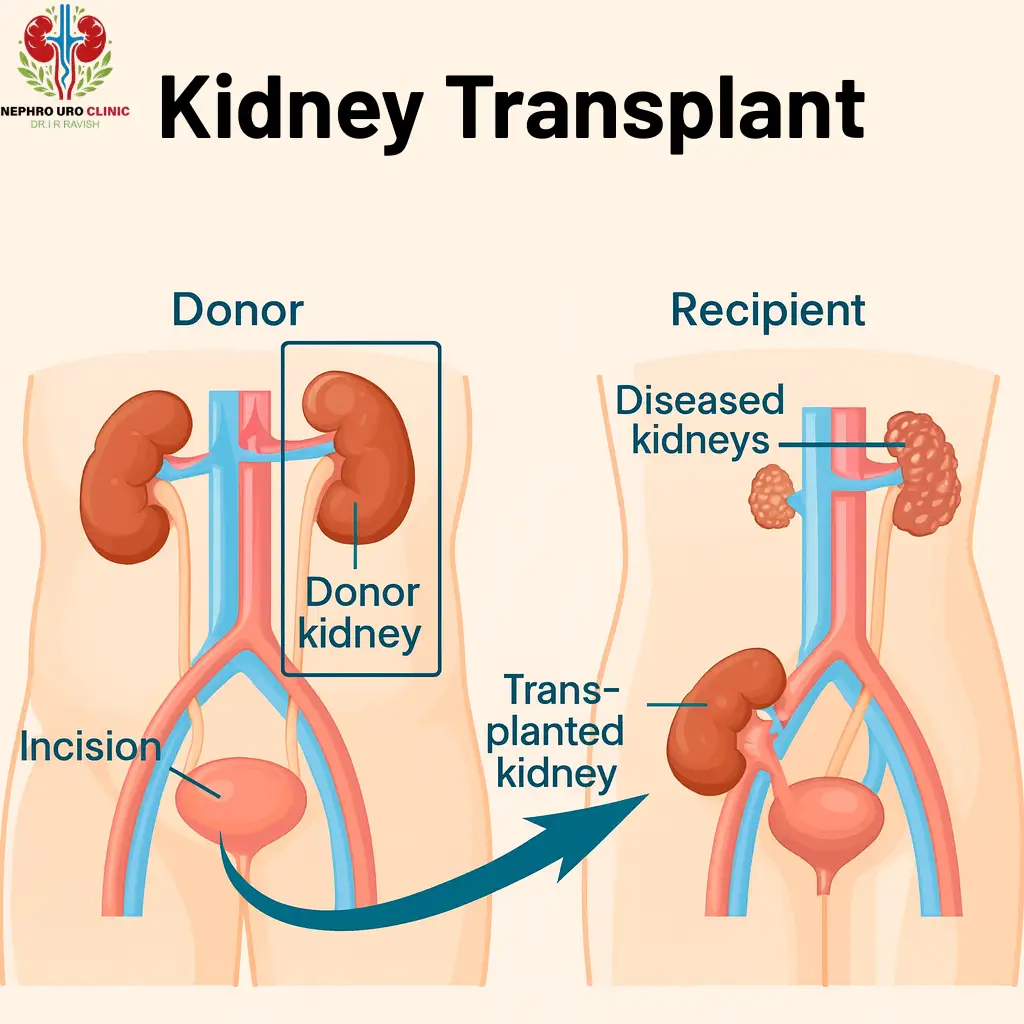A kidney transplant is a life-saving procedure for patients with end-stage renal disease, offering improved quality of life compared to long-term dialysis. Bangalore has become a leading destination for renal transplants due to its advanced hospitals and skilled surgeons. However, the kidney transplant cost in Bangalore is a critical factor that patients must consider alongside medical aspects. Understanding the expenses involved in a kidney transplant in Bangalore, and how they compare with other cities or countries, helps families plan better and make informed decisions.
Cost Breakdown of Kidney Transplant
The total cost of a kidney transplant includes multiple components, from preliminary tests to post-operative care. Below is a breakdown of key elements contributing to the overall expense:
- Pre-transplant Evaluation: This covers all the medical tests and evaluations for the patient and potential donor before surgery. It typically ranges around ₹50,000 to ₹1,00,000, which includes blood tests, tissue matching, and other diagnostics.
- Surgery (Donor & Recipient): The transplant operation itself (including the donor’s nephrectomy and the recipient’s surgery) is the biggest component. In India, this surgical procedure usually costs roughly ₹4,00,000 to ₹7,00,000. This fee encompasses the surgical team’s charges, operating theater costs, anesthesia, etc.
- Hospitalization & ICU Stay: After surgery, the recipient may spend 10–15 days in the hospital (including ICU for a few days). This hospital stay can add about ₹1,00,000 to ₹2,00,000 to the bill, covering room charges, nursing care, and any intensive care required immediately post-transplant.
- Medications (First Year): The first year after transplant involves regular medicines, mainly anti-rejection drugs to prevent the body from attacking the new kidney. These medicines are costly, often totaling ₹1,00,000 to ₹2,00,000 for the year. They are critical and need to be taken lifelong, which adds ongoing expense.
- Legal and Documentation Fees: In India, an authorization committee must approve all transplants (especially if the donor is not a close relative). The paperwork and legal compliance for a kidney transplant can cost around ₹50,000, which covers administrative fees for documentation and clearance.
(The figures above are approximate ranges. Actual costs can vary based on hospital policies, patient condition, and complication management.)
Bangalore vs Other Cities: Cost
Bangalore’s transplant costs are on par with other major Indian metros, offering competitive pricing for high-quality care. The table below compares the kidney transplant cost in Bangalore with that in other top cities in India, including minimum, average, and maximum estimated expenses:
| City | Min (INR) | Avg (INR) | Max (INR) |
| Bangalore | ₹6,64,089 | ₹9,96,134 | ₹13,28,096 |
| Delhi | ₹6,76,630 | ₹10,54,945 | ₹14,53,261 |
| Mumbai | ₹7,01,277 | ₹11,51,916 | ₹15,00,000 |
| Chennai | ₹6,08,225 | ₹9,12,338 | ₹12,16,451 |
| Hyderabad | ₹5,89,631 | ₹8,84,406 | ₹11,79,180 |
| Ahmedabad | ₹5,64,757 | ₹8,47,135 | ₹11,29,514 |
| Pune | ₹6,39,215 | ₹9,58,864 | ₹12,78,513 |
| Kolkata | ₹5,39,965 | ₹9,09,948 | ₹10,79,848 |
| Jaipur | ₹4,50,000 | ₹7,97,135 | ₹10,90,537 |
These cost ranges are compiled from hospital estimates across India. They reflect the kidney transplant cost in Bangalore and other cities, including surgery and hospitalization, but individual hospitals may quote different prices. Notably, Bangalore’s average cost (~₹10 lakh) is in the mid-range among metros, lower than Mumbai but slightly higher than cities like Kolkata or Jaipur.
India vs Abroad: Transplant Cost
When comparing India (Bangalore) to other countries, the contrast in kidney transplant expenses and waiting times is significant. India offers one of the most affordable transplant costs in the world, whereas developed countries can be extremely expensive and have long waiting periods for organ availability. The table below highlights the approximate cost and typical waiting time for a kidney transplant in India (Bangalore) versus other countries:
| Country | Approx. Cost (USD) | Approx. Cost (INR) | Average Waiting Period |
| India (Bangalore) | ~$13,000 | (~₹10.8 Lakhs) | Minimal (if living donor available) |
| United States | $400,000+ | (~₹3.32 Crores) | 3–5 years |
| United Kingdom | ~$70,000 | (~₹58 Lakhs) | 2–3 years |
| Canada | ~$145,000 | (~₹1.20 Crores) | 2.5–3 years |
| Australia | ~$100,000 | (~₹83 Lakhs) | ~2.2 years |
| Turkey | ~$16,000 | (~₹13.3 Lakhs) | Minimal (if living donor available) |
| Mexico | ~$38,000 | (~₹31.5 Lakhs) | Minimal (if living donor available) |
| South Korea | $40,000–$70,000 | (~₹33.2 Lakhs – ₹58 Lakhs) | Minimal (if living donor available) |
In Western countries like the US, Canada, or the UK, patients often wait years for a deceased-donor kidney due to organ shortages, which adds to indirect costs (years on dialysis). In contrast, kidney transplant in Bangalore and other Indian cities can be arranged relatively quickly if a suitable living donor is readily available – essentially no waiting list for those who have an eligible donor.
Disclaimer: The costs and waiting periods mentioned above are approximate estimates gathered from publicly available sources. Actual expenses for a kidney transplant in Bangalore or abroad may vary depending on the hospital, surgeon’s expertise, donor availability, patient’s health condition, and insurance coverage.

Insurance & Financial Help
Managing the kidney transplant cost in Bangalore can be challenging, but there are several support systems to ease the burden:
- Health Insurance: Many insurance plans cover transplant surgeries, hospital bills, and sometimes donor expenses. Some hospitals also offer cashless treatment when partnered with insurers.
- Government Schemes: Programs like Ayushman Bharat and Karnataka state initiatives support low-income patients, with some offering free transplants.
- NGO Assistance: Non-profits and charities often provide funds or help patients connect with sponsors, especially for kidney donors in Bangalore.
- Crowdfunding & Loans: Families can raise funds online or access medical loans/EMIs to cover expenses.
- Hospital Counselors: Most transplant centers have financial counselors to guide patients on costs, paperwork, and available schemes.
By combining insurance with these support systems, and consulting the best kidney transplant doctor in Bangalore, patients can significantly reduce overall treatment costs and access quality care.
Kidney Transplant Success Rate in Bangalore
- Overall Success Rate (90%–96%): Across India, kidney transplant outcomes are highly positive, with success rates averaging between 90% and 96%. This shows that most patients experience long-term benefits after surgery.
- One-Year Graft Survival (97%–99%): In Bangalore, one-year survival rates are excellent, with 97% success for deceased donors and up to 99% for living donors. This demonstrates the effectiveness of timely surgery and quality post-operative care.
- Ten-Year Survival (Around 85%): Studies show that nearly 85% of transplanted kidneys continue functioning even after 10 years. This long-term durability highlights the value of undergoing a kidney transplant in Bangalore.
Factors that Affect Kidney Transplant Costs
The kidney transplant cost in Bangalore can vary based on several factors:
- Donor Availability: Having a living donor reduces waiting and dialysis costs, while fewer kidney donors in Bangalore may increase expenses if patients rely on deceased donor lists or paired exchanges.
- Type of Hospital: Private hospitals usually charge more due to advanced facilities, while government hospitals offer lower-cost options but may involve longer waiting times.
- Hospital Location: Metro cities are more expensive than smaller towns. The kidney transplant cost in Bangalore is often less than in Delhi or Mumbai but can still vary between premium and mid-range hospitals.
- Surgical Technique: Laparoscopic surgeries cost more than open procedures but reduce donor recovery time. Complex cases also add to the bill.
- Surgeon’s Expertise: Choosing the best kidney transplant doctor in Bangalore increases cost, but many patients prefer paying extra for proven expertise and safety.
- Pre-Transplant Tests: Compatibility checks, imaging, and evaluations for other health conditions add to the total package price.
- Post-Operative Care: Longer ICU stays or complications like rejection episodes increase hospitalization expenses.
- Medications & Follow-Up: Immunosuppressants are lifelong and cost several thousand rupees monthly, especially in the first year.
- Accommodation & Miscellaneous: Patients from outside Bangalore must factor in travel, stay, food, and other living expenses.
Each case is unique, so patients planning a kidney transplant in Bangalore should request a detailed cost estimate to understand their potential expenses.
Key Information for Patients
For those considering a kidney transplant in Bangalore, here are some key points:
Find a Suitable Donor Early: Identifying a living donor (usually a family member) improves success rates and avoids long waits for a deceased donor. In Bangalore, kidney donors are usually close relatives for faster approval. Unrelated donors need government authorization, which is time-consuming.
Understand the Legal Process: India has strict laws against organ trafficking. All transplants need clearance from the Authorization Committee with complete paperwork. Foreign patients cannot receive organs from Indian donors – they must bring a donor from their home country.
Choose an Experienced Transplant Center: Select a hospital with strong transplant expertise, ICU support, and advanced facilities. Consulting the best kidney transplant doctor in Bangalore ensures safe surgery and aftercare. Checking credentials, second opinions, and patient reviews can help.
Plan Your Finances: The kidney transplant cost in Bangalore varies widely. Check hospital package deals and insurance coverage. Keep a contingency fund for medications or complications, as post-surgery expenses can add up.
Post-Transplant Care is Key: Success depends on strict use of immunosuppressants and regular follow-ups in Bangalore. Many patients need to stay in the city for weeks after surgery. A healthy lifestyle and infection precautions help the kidney last longer.
Support Systems and Rehabilitation: Emotional support is important. Bangalore has patient support groups and counselors. Most patients return to work in 2–3 months. Family and friends play a crucial role during recovery.
Be Prepared for Challenges: Delays or minor complications may occur. Have flexibility in time and funds. Learn the signs of rejection or infection (fever, low urine output, pain) and seek immediate medical help.
With proper planning, financial readiness, and post-surgery care, patients can approach their kidney transplant in Bangalore with confidence for the best outcome.
Conclusion
Kidney transplant cost in Bangalore typically ranges between ₹5,00,000 to ₹9,00,000, making it far more affordable than in many other countries. Despite the lower cost, patients benefit from high-quality care, advanced medical facilities, and excellent success rates. With the guidance of the best kidney transplant doctor in Bangalore, the procedure becomes both medically effective and financially manageable. Compared to the lifelong expense of dialysis, a kidney transplant is a more cost-efficient and life-enhancing solution.




